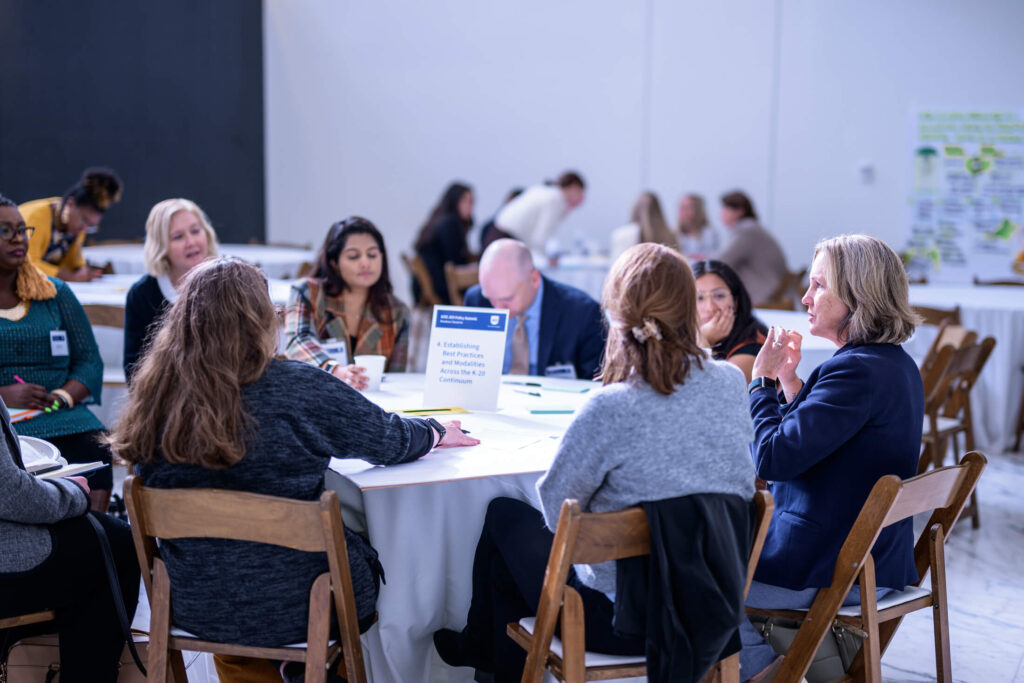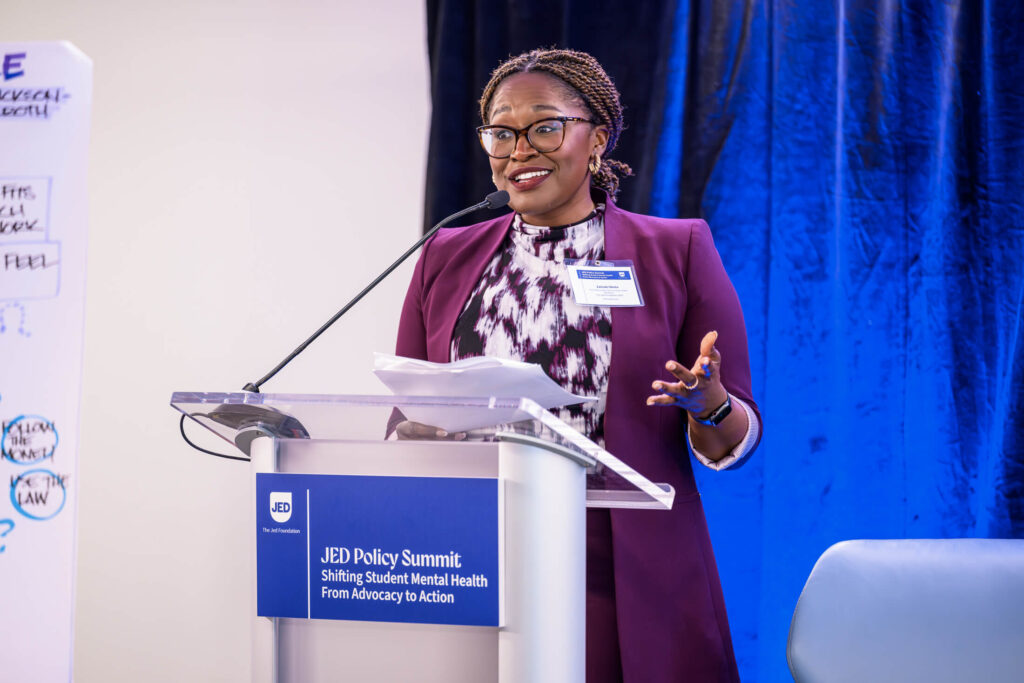Cyberbullying Resources for Parents and Caregivers
As caring and supportive adults, we aspire to guide youth toward becoming compassionate, understanding, and resilient individuals. In a world where social and emotional challenges ...

By Rebecca Bauer
On October 30, 2023, more than 100 mental health experts, advocates, and allies gathered in Washington, D.C., for the JED Policy Summit: Shifting Student Mental Health From Advocacy to Action. Jed Foundation (JED) CEO John MacPhee kicked off the event with a welcome to all and a reminder that no single organization can solve our youth mental health crisis alone, which is why the main goal of the inaugural event was coalition-building.
The room was filled with powerful partners in the field of youth mental health, coming together to identify common goals and establish a working relationship that will create a stronger mental health ecosystem for all youth and their families.
Cross-sector collaboration was the bedrock for this event, with presentations by leading experts from government agencies, nonprofit organizations, and institutes of higher education. Throughout the keynote and panel discussions, several key takeaways emerged. To address the mental health crisis, we must:
Across the country, youth are actively seeking help for mental health challenges — and they are met with an astounding lack of options. To ensure that all youth have access to potentially life-saving care, policy reform is vital. Advocates and policy makers must urge insurance companies to play a role in increasing the supply and diversity of in-network mental health care providers.
Keynote speaker, Rafael Campos, the deputy director of public engagement for the Office of the Surgeon General, highlighted the importance of creating a pipeline to increase the number of BIPOC mental health care providers so that youth can access services provided by people in their own communities.
Campos stressed the significance of representation in the mental health sector. “The human capital component is so important,” he said. “If I’m a young person and I want to speak out about my mental health, it’s going to be a lot easier if someone across the room looks like me and sounds like me.”
Providing high-quality health care to all children requires not only a reliable pool of health care providers trained to support youth but also policies to ensure that services are affordable to all. Presenters spoke passionately about mental health parity — the equal treatment of mental health conditions in insurance plans — emphasizing that rule changes can be mechanisms to ensure that individuals can actually make use of mental health services.
Laura Conrad, from the Technical Assistance Collaborative, reminded the audience that leveraging Medicaid, which approximately half of children receive, is a powerful approach in enabling youth to receive vital mental health services in school.

Strategic implementation takes policy and turns it into action and impact. Campos emphasized that trusted community partners are key to success. “Sometimes it’s not the information we’re talking about; it’s the messenger,” he said. Particularly in the changing political environment, empowering trusted leaders like librarians and educators can help us reach common ground on protecting youth mental health.
Donna Volpitta, co-founder of the Mental Health Literacy Collaborative, called for clear national standards that provide schools with the guidance they need to put a plan into action. “We can’t treat our way out of this crisis. We can’t legislate out of this crisis,” she said. “We need to understand how to address that gap between policy and practice.”
Campos indicated that while technology poses risks, we can’t be afraid to use it for good. Telehealth, in particular, has significant potential to reduce barriers to care.
Campos said that social media use is both a concern and an opportunity. “What’s difficult with the topic is not that social media is bad and no one should use it,” he explained. “The worry is you’ve let loose a platform and algorithms without taking into account what kind of safeguards are needed.”
There are parallels to the emergence of automobiles, Campos said. To reduce the dangers of car accidents, for example, we required manufacturers to install safety features like seatbelts and airbags. Now is the time to make similar demands of social media companies.
Youth are asking adults to think big when it comes to supporting the well-being of their generation, which is why all efforts must center youth voices. Young people have valuable perspectives to share and can play a pivotal role in building mental health care systems of the future. During the summit’s youth panel, presenters spoke powerfully about their experiences navigating inequities in education, health disparities, and other systemic challenges.
Youth don’t just deserve a seat at the table — they should help craft the agenda. Jorge Alvarez, a social impact strategist and mental health advocate, offered a call to action for the adults in the room: “It’s important for leadership to trust youth … and ask us how we want to be engaged, how we want to be incorporated, what our strengths are.”
Every panel emphasized the urgency with which we need to take action. Dr. Lisa Wiggins,, a behavioral health scientist at the Centers for Disease Control and Prevention (CDC), shared alarming statistics on the current state of youth mental health, followed by a clear appeal to the audience: “When we hear these numbers, when we see these numbers, they force us as a community to act.”
Everyone in that room was ready to take up that call. Dr. Zainab Okolo, JED’s senior vice president of policy, advocacy, and government relations, closed out the summit by introducing the foundation’s three policy levers to advance national change that can result in meaningful improvement in youth mental health:
“The time is now. The data tells us so,” Okolo said. “None of us owns the problem, but with all of us working together, we do have the solution.”
If you or someone you know needs to talk to someone right now, text, call, or chat 988 for a free confidential conversation with a trained counselor 24/7.
You can also contact the Crisis Text Line by texting HOME to 741-741.
If this is a medical emergency or if there is immediate danger of harm, call 911 and explain that you need support for a mental health crisis.